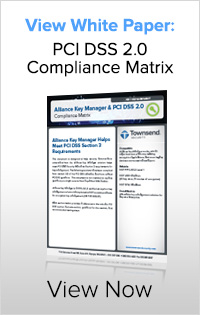In 2013 merchants should ask: Will we pass our PCI audit this year using the same technology and standards we used last year? The answer is possibly not.
 Businesses that accept credit cards have to meet PCI-DSS compliance requirements and encrypt credit card numbers using industry standard encryption and good encryption key management practices. They are often shocked and surprised when, after passing a compliance audit for a number years, they suddenly fail an audit around encryption key management practices. Audit failure due to poor encryption key management has begun to happen more frequently within the past year.
Businesses that accept credit cards have to meet PCI-DSS compliance requirements and encrypt credit card numbers using industry standard encryption and good encryption key management practices. They are often shocked and surprised when, after passing a compliance audit for a number years, they suddenly fail an audit around encryption key management practices. Audit failure due to poor encryption key management has begun to happen more frequently within the past year.
Let’s take a look at one scenario of a customer we helped this year.
A large retailer with a Level 1 merchant designation processes tens of thousands of credit card transactions every year. Card transactions originate through point-of-sale (POS) terminals in stores, through web-based eCommerce applications, and telephone orders. A pretty typical retail operation in many ways. This Level 1 merchant had passed on-site QSA audits for several years. Suddenly, this year they failed their PCI-DSS audit.
Why did this happen? Because the encryption key used to protect credit card numbers was stored on the same server as the protected data.
In the last year or so, failing PCI-DSS audit due to poor encryption key management is actually far more common than you might think. In this case a new QSA auditor was assigned to the merchant, and the auditor was quite knowledgeable about security practices in general, and key management in particular. The previous auditor had granted the merchant “compensating controls” for their encryption key management strategy - but the new auditor found that the compensating controls were inadequate for proper encryption key protection. Thus the audit failure and the need to remediate encryption key management.
Here are a few thoughts that might be helpful to merchants reviewing their encryption key management practices:
- PCI DSS standards are not set in stone. The PCI Security Standards Council has been very transparent in letting merchants know that the standards can and will evolve as security threats evolve. What you are doing today may not be adequate to protect your systems tomorrow.
- QSA auditors vary in their assessment of risk and requirements to meet the standards. And as the security threat environment changes, they can revise their assessment practices and requirements for merchants. Compensating controls that might have been appropriate in the past, may no longer be appropriate.
- In the early years of PCI audits, the focus may have been more on basic compliance with high priority security tasks given priority. As time has gone by, attention is now more focused on tightening up critical components like encryption key management. Weak encryption key management practices and compensating controls are falling by the wayside.
- QSA auditors are a lot more educated on the issues of Dual Control and Separation of Duties for encryption key management systems. It is almost impossible to implement a encryption key management system on the same platform as protected data, and meet these security requirements. Protecting encryption keys with purpose-built key management hardware security modules (HSM) is now a typical requirement for PCI DSS compliance.
So what can a merchant do if they want to make sure they will pas their PCI-DSS audit this year?
- Review your encryption key management implementation now. If your implementation does not meet security best practices for encryption key management, start planning on what you will do to remediate the problem.
- Ask yourself: Were we operating under compensating controls for encryption key management? It would be wise to assume these won’t be renewed at some point in the future.
- Ask yourself: Are we storing our encryption keys on the same server as the credit card number? Start planning now on how you will respond in the event of an audit failure.
Good encryption key management is no longer a time-consuming, expensive proposition. Our Level 1 merchant was able to remediate the problem in under 30 days with their own IT team and without the need for on-site consultants from Townsend Security. To learn more about encryption key management and meeting PCI-DSS, download our White Paper, Encryption Key Management for PCI-DSS.

